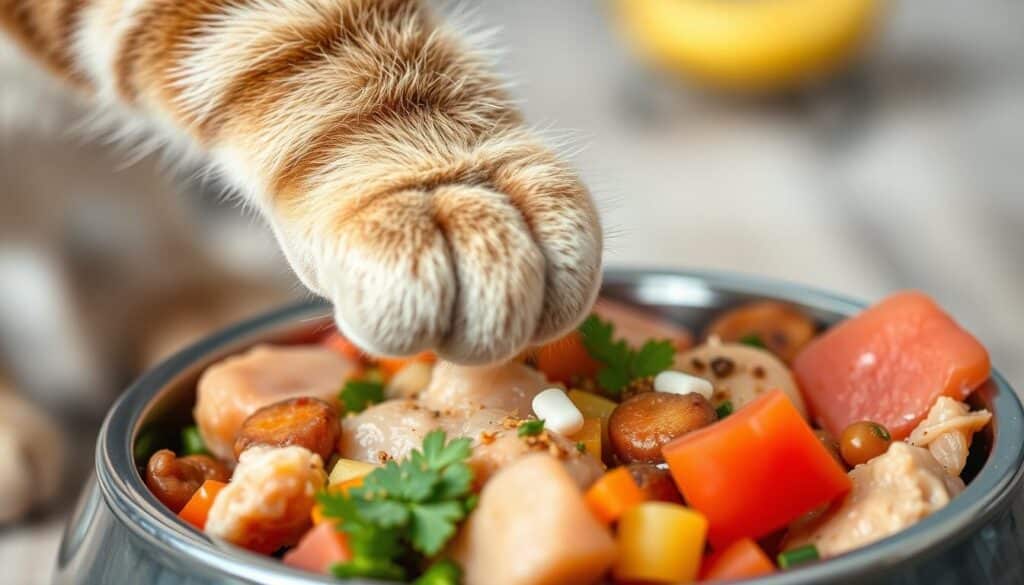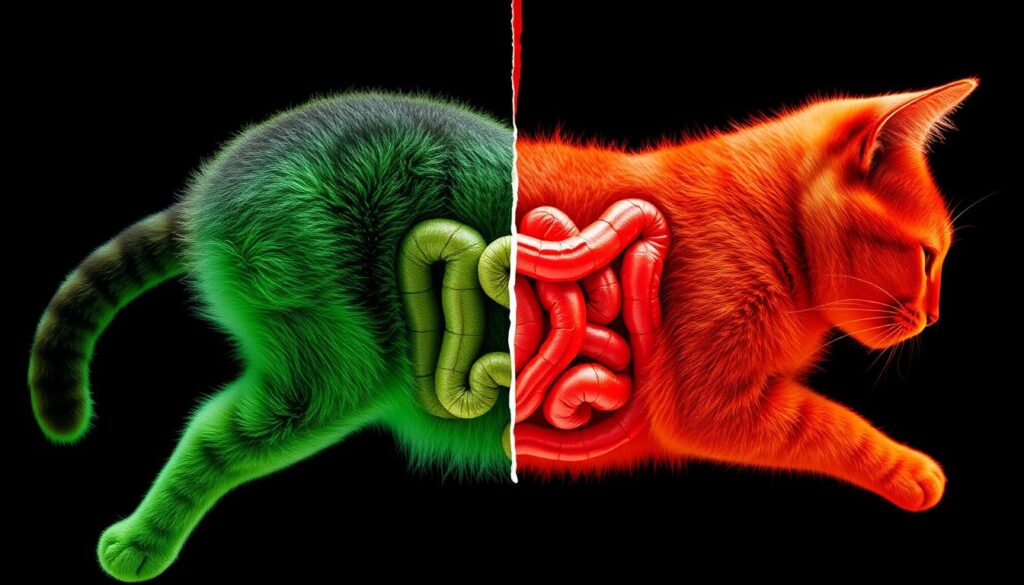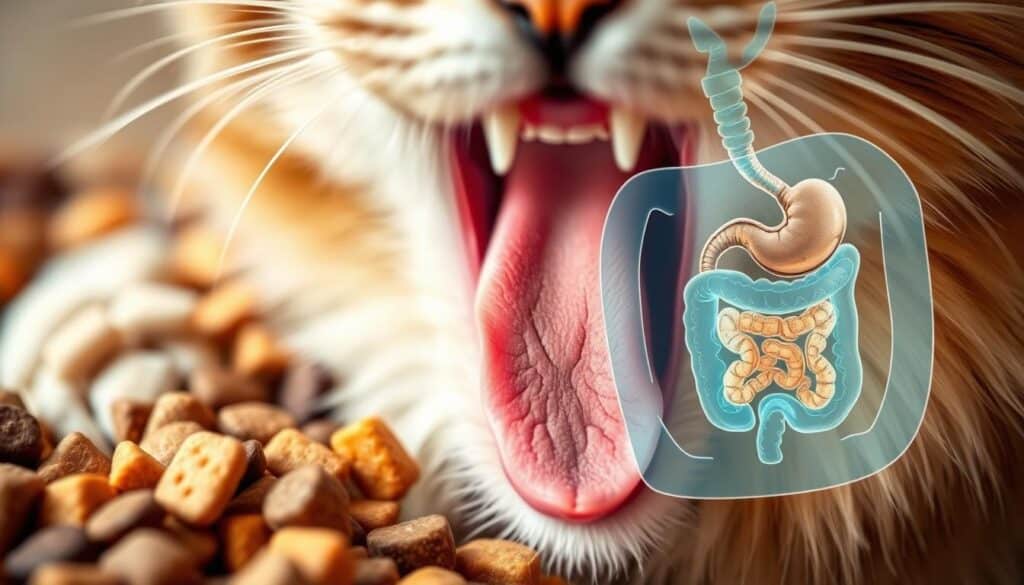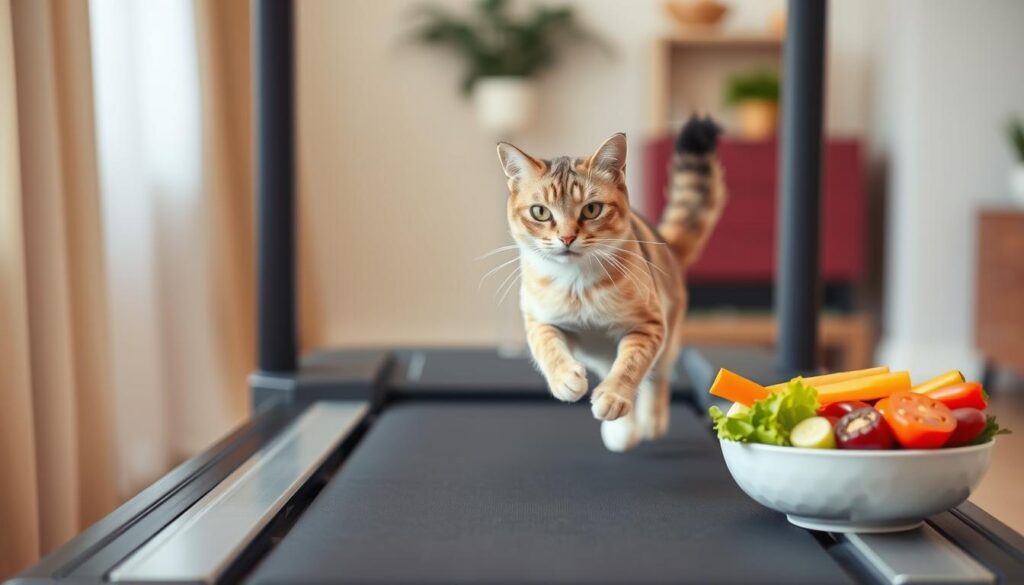How To Improve Cat Digestive Health Keeping your cat’s digestive health in check is key to their overall health. Their gut is home to hundreds of microorganisms that help with digestion, absorbing nutrients, and fighting off infections. But, things like diet, antibiotics, and stress can upset this balance, causing feline digestive issues. This article will show you how to boost your cat’s gut health with better food, supplements, and lifestyle changes.
Key Takeaways
- A cat’s gut microbiome is essential for overall health and well-being.
- Factors like diet, antibiotics, and stress can disrupt the balance of gut bacteria.
- Improving cat digestive health requires a multi-faceted approach.
- Dietary changes, supplements, and lifestyle modifications can help support a healthy gut.
- Understanding the factors that affect cat gut health is crucial for maintaining a happy, healthy feline.
Understanding Your Cat’s Gut Health
Your cat’s gut microbiome is key to its health and happiness. It’s a complex mix of bacteria, fungi, and other tiny organisms in the digestive tract. They help with digestion, absorbing nutrients, and keeping the immune system strong. Knowing about the gut microbiome and what affects it is important for your cat’s gut bacteria balance and digestive health.
The Role of Gut Microbiome
The gut microbiome is full of different microorganisms that support your cat’s feline digestive tract. These bacteria help break down food, make important vitamins, and keep the immune system working right. A healthy gut microbiome keeps your cat’s digestion running smoothly, stops bad bacteria from growing, and affects its overall health and mood.
Factors Affecting Gut Bacteria Balance
Many things can upset the balance of your cat’s gut microbiome, including:
- Diet: What your cat eats greatly affects its gut bacteria.
- Antibiotic use: Antibiotics can kill good and bad bacteria, leading to an imbalance.
- Stress: Changes in the environment, illness, and stress can also harm the cat gut microbiome.
Knowing and fixing these issues can help keep your cat’s gut bacteria balance healthy, supporting its digestive health.
Dietary Approaches to Improve Cat Digestive Health

Cats need a diet high in protein and low in carbohydrates for good digestive health. Feeding them high-protein, low-carb cat food helps. It supports a healthy gut by growing good bacteria and cutting down on carbs that cause inflammation.
High-Protein, Low-Carb Cat Food
Cats are meant to eat food that’s similar to their natural prey. This means lots of protein and few carbs. By picking high-protein, low-carb cat food, you make sure your cat gets the right nutrients. This diet keeps their gut healthy and lowers the chance of digestive problems.
Prebiotics and Probiotics
Adding prebiotics and probiotics to your cat’s diet also helps with digestion. Prebiotics feed the good gut bacteria, and probiotics add more good bacteria. These supplements make sure your cat’s gut has a healthy balance of bacteria. This is key for their overall health.
When changing your cat’s diet, do it slowly. Quick changes can upset their stomach. Be patient and watch how your cat reacts to the new food.
“Maintaining a healthy gut microbiome is key to supporting your cat’s overall well-being.”
Fecal Microbiota Transplant for Cats
For cats with severe gut problems or chronic digestive issues, fecal microbiota transplant (FMT) could be a game-changer. This method moves healthy gut bacteria from one cat to another with an unhealthy gut, usually through a capsule or enema. It aims to fix the balance of gut bacteria and ease ongoing digestive problems.
Usually, FMT happens in a vet’s office. But, some companies now offer it at home for cat owners. This makes it easier for pet owners to try this new treatment for their cat’s fecal microbiota transplant for cats or restoring gut bacteria in cats.
Exploring the Benefits of FMT for Cats
FMT has proven effective against many cat digestive disorder treatments, such as:
- Inflammatory bowel disease (IBD)
- Chronic diarrhea
- Antibiotic-associated dysbiosis
- Clostridium difficile infection
By adding healthy bacteria to the gut, FMT can ease symptoms, boost nutrient absorption, and support digestion in cats.
| Procedure | Success Rate | Potential Risks |
|---|---|---|
| Fecal Microbiota Transplant | 60-90% success rate in improving gut health and reducing digestive symptoms in cats | Mild side effects such as temporary diarrhea or vomiting, risk of infection |
“FMT has the potential to revolutionize the way we treat chronic digestive issues in cats. By restoring the balance of gut bacteria, we can significantly improve the overall health and well-being of our feline friends.”
As research grows, fecal microbiota transplant for cats is becoming a safe and effective way to help cats with ongoing digestive problems.
Antibiotic Use and Gut Health

Antibiotics have both good and bad sides for your cat’s gut health. They can fight infections but also upset the balance of good and bad bacteria in your cat’s gut.
Supporting Gut Health During Antibiotic Treatment
When your cat is on antibiotics, it’s key to keep their gut healthy. Think about adding a probiotic like Saccharomyces boulardii. This yeast is safe from antibiotics and helps keep the good bacteria in check. It stops bad bacteria from taking over and helps your cat’s good gut bacteria come back.
Restoring Gut Balance After Antibiotics
After antibiotics, it’s important to get your cat’s gut back in balance. You might consider a gut health test to see how your cat’s good bacteria are doing. Then, you can make changes to their diet or add supplements to help their gut heal.
Knowing how antibiotics affect your cat’s gut and taking steps to help it recover is key. This way, your cat can get over antibiotics and keep their digestive system healthy and balanced.
Oral Health and Gut Health Connection

Keeping your cat’s mouth clean is key for their gut health. Bacteria from bad oral health can move from the mouth to the gut. This can lead to chronic inflammation and upset the gut balance. Bacteria like Klebsiella, found in the mouth, can settle in the gut and cause digestive problems.
Brushing your cat’s teeth with a safe toothpaste can cut down on these harmful bacteria. This helps keep their gut healthy. Good dental care can make a big difference in your cat’s digestion, leading to a healthier gut and less inflammation.
The connection between cat oral health and gut health is clear. Bacteria from the mouth can move to the gut, upsetting the balance and causing chronic inflammation from oral bacteria.
“Maintaining your cat’s oral hygiene is not just about their teeth and gums – it’s also crucial for their overall digestive health and well-being.”
By focusing on your cat’s dental care and brushing their teeth regularly, you can stop harmful bacteria from moving to the gut. This approach supports a balanced, healthy gut. It can reduce the risk of digestive problems and improve your cat’s overall health.
How To Improve Cat Digestive Health

Keeping your cat’s digestive system healthy is key to their overall health. Changing their diet can help a lot, but there are other ways to support their gut health too.
Encouraging Exercise and Mental Stimulation
Regular exercise and mental challenges can reduce stress. This stress can upset your cat’s gut balance. Playing with your cat and giving them puzzle toys helps with both physical and mental exercise. This keeps their digestive system healthy.
Gradual Diet Transitions
When changing your cat’s diet, do it slowly over 7 days. This slow transition lets their digestive system get used to the new food. It helps avoid problems like vomiting or diarrhea.
Adequate Water Intake
Make sure your cat drinks enough water by offering fresh, clean water and maybe a water fountain. Drinking enough water helps with regular bowel movements and gut health.
Adding these lifestyle changes and diet tweaks can really help your cat’s gut health and overall health.
Conclusion
Keeping your cat’s digestive health in top shape is key to their overall health. Understanding how the gut microbiome works and making smart food choices can help. This includes feeding them high-protein, low-carb food and adding prebiotics and probiotics.
Advanced treatments like fecal microbiota transplants and careful use of antibiotics can also boost your cat’s gut health. It’s important to see how oral health affects gut health too. This complete approach helps improve your cat’s digestion.
Making changes to their diet, lifestyle, and getting vet advice can protect your cat’s gut microbiome. By keeping up with their digestive needs, you help them live a happy, healthy life. Being informed and taking action can ensure your cat stays well for a long time.
FAQs
Q: What are common digestive problems in cats?
A: Common digestive problems in cats include constipation, diarrhea, vomiting, and hairballs. These issues can often lead to more serious health problems if not addressed.
Q: How can I help prevent digestive issues in my cat?
A: To help prevent digestive problems, ensure your cat has a balanced diet adapted to their needs, provide plenty of fresh water, and encourage regular grooming to reduce hairballs.
Q: What should I look for in cat food to support digestive health?
A: Choose cat food specially formulated to help support digestion. Look for ingredients that promote a balanced gut microbiome and are designed to prevent digestive upset.
Q: How can I tell if my cat is experiencing digestive upset?
A: Signs of digestive upset in cats may include changes in stool consistency, vomiting, abdominal pain, or a noticeable decrease in appetite. Monitoring your cat’s behavior and litter box habits can help identify these issues.
Q: Can food allergies cause digestive problems in cats?
A: Yes, food allergies can lead to digestive issues in cats. Symptoms may include vomiting, diarrhea, and abdominal discomfort. If you suspect allergies, consult your veterinarian for advice on dietary changes.
Q: How can I help my cat with constipation?
A: To help your cat with constipation, increase their water intake, provide a diet rich in fiber, and ensure regular exercise. If problems persist, consult your veterinarian for further evaluation and treatment options.
Q: What role do hairballs play in cat digestive health?
A: Hairballs can lead to digestive problems as they can cause blockages in the intestinal tract. Regular grooming and feeding hairball control formulas can help minimize their occurrence and support your cat’s digestive health.
Q: Are there underlying health conditions that can affect my cat’s digestion?
A: Yes, underlying health conditions such as intestinal diseases, infections, or metabolic disorders can significantly affect your cat’s digestion. Regular veterinary check-ups can help identify and manage these issues.
Q: How can I keep my cat’s litter box habits regular?
A: To keep your cat’s litter box habits regular, ensure that they have a clean and accessible litter box, provide a consistent diet, and monitor their water intake. These factors can help prevent constipation and other digestive problems.
Source Links
- https://www.purina-arabia.com/articles/cats/health/digestion/cat-gut-health
- https://www.purina.co.uk/articles/cats/health/digestion/cat-gut-health
- https://kittybiome.com/expert-advice/9-ways-to-improve-your-cats-digestive-health/




